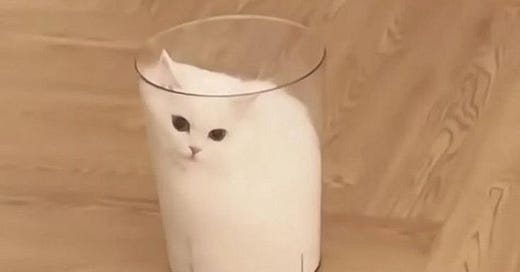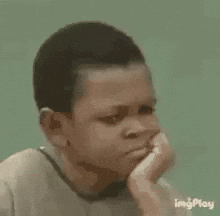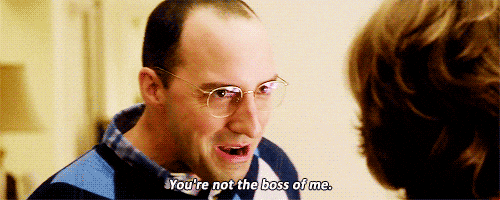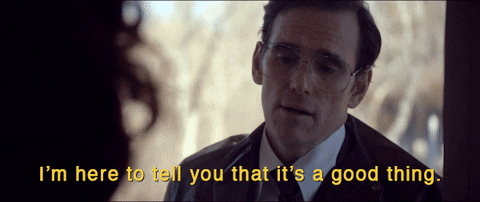Not you letting your past be the reason you’re still stuck
Week 8: The Bare Minimum Artist's Way
We’re on week 8 of our 12-week journey through The Bare Minimum Artist’s Way — our ADHD-friendly version of The Artist’s Way by Julia Cameron.
If you’re just landing here for the first time — welcome! We’re suspending the dogma rules about morning pages and artist dates and doing the bare minimum with The Artist’s Way, because we believe half-assing it is better than giving up on Week 3 .
Sound like you? Join us here on Substack and listen to our weekly companion episodes every Wednesday on Spotify and Apple Podcasts.
Oh, you thought you’d get out of this unscathed…
Have you ever felt like you’re waiting for permission to go all in on your creative work? Like you’ve been subtly outsourcing your confidence to other people like mentors, teachers, or even random people on the internet who don’t even know you exist?
In week 8, Julia Cameron invites us to stop handing over creative authority to other people and to stop waiting for some external sign that you’re good enough.
This chapter is about resilience and realizing that rejection, failure, and creative setbacks aren’t signs you should quit— they’re the whole creative game.
Malignant Mentors & the Pedestal Problem
Ever followed someone online and slowly started questioning your own instincts because of how confident they seem? Maybe it’s a coach, a business leader, or just a creator who seems to really have their shit together in a way that makes you doubt your own abilities. At first, it’s admiration. But then, before you know it, their voice is in your head every time you go to create something.
We assume they must know better than we do. That their way is the way. And consequently, we shrink ourselves, adjust our instincts to align with theirs, and start playing small in our own work.
The tricky thing about this is that it doesn’t happen all at once. It’s a slow creep. One day, you’re inspired by their confidence. The next, you’re second-guessing your own ideas because they wouldn’t do it that way. Suddenly, your creativity isn’t yours anymore and it’s filtered through the lens of what you think they would approve of.
This is how we lose our creative edge—not because we’re incapable, but because we stop trusting ourselves.
When we start doubting our own instincts and worshipping the way someone else does it, we often put people on a pedestal.
Pedestalizing people is a subtle way of giving up our creative power.
And sometimes, we find ourselves with what she calls “malignant mentors.” In the beginning, they might be the person who opened your eyes to a new way of thinking, gave you a sense of direction, or even helped you take your first steps in your creative work. But over time, something shifts.
Maybe you start to feel stifled by their approach. Maybe you notice that their advice that once expansive now feels limiting. Or maybe, as you start to grow, you sense their subtle resistance to your evolution.
A malignant mentor can become toxic in two ways: either you’ve outgrown them, or they can’t handle your growth. Some mentors hold on too tightly, expecting you to stay small so they can remain the authority.
Others project their own insecurities onto you, subtly discouraging you from stepping outside the lines they’ve drawn. And if you’re not careful, you internalize it.
You make up a story about yourself that keeps you stuck. You hesitate. You play small. You second-guess your instincts, because somewhere along the way, you started believing that their way was the only way.
The most dangerous thing about a malignant mentor is that you don’t always realize when the relationship has turned.
It’s easy to justify staying in their orbit because they helped you! You care about them! But a good mentor’s job isn’t to keep you dependent on them.
A good mentor wants you to surpass them. If you sense that your creative instincts are clashing with their teachings, or that they’re subtly undermining your confidence, it might be time to step away.
Julia Cameron challenges us to examine where we’ve unconsciously let others shape our creative identity.
Whose opinions are keeping you from trusting yourself?
Who have you outgrown but still feel tethered to?
And most importantly: why do you think they know better than you do?
The moment you stop looking for someone else to validate your creative choices is the moment you take back your power.
Turning Loss into Creative Fuel
Let’s be real: rejection hurts. And creative rejection is a particular kind of cruelty.
In week 8, Julia Cameron implores us to ask, what if rejection and failure aren’t dead ends but actual stepping stones? What if every setback is handing you the exact lesson you need to level up?
How many times have you looked back on something that felt like a disaster at the time, only to realize later that it redirected you toward something even better? That’s what she’s talking about here: loss disguised as gain.
We all carry creative wounds— the event that flopped, the business that never got off the ground, the video you poured your heart and soul into and it was met with crickets.
But sitting in that loss forever is a choice. At some point, you have to decide if you’re going to let this moment define you or if you’re going to use it as fuel to move you forward.
Because the truth is that every successful creative has a graveyard of failed ideas behind them. The difference is they allowed the losses sharpen them, not break them
One of the sneakiest lies that creatives use to stay stuck is saying it’s too late for me.
I’m too old to go back to school.
I’m too old to start a Youtube channel.
It’s too late to start a business.
Or, even worse: I’ll do it when I’m retired.
Your age is irrelevant. Your past doesn’t matter. The only real question is do you want it badly enough to start now?
We tell ourselves we’ll wait until we’re “ready.” But when is that exactly?
Readiness is a myth we use to avoid confronting our fear and insecurity. The people who succeed aren’t the ones who wait for clarity—they’re the ones who move through uncertainty and figure it out as they go.
The best time to start was probably ten years ago. But, the second-best time can be right now.










Wow the story about singing resonated SO HARD with me. I had a similar experience being in choir in high school, feeling like I finally found my people/community, and then had a couple rejections which I took extremely badly and I stopped for many years, and it did feel like I killed a part of myself. I tried out for a community choir a few years ago but never ended up going. Anyway thank you for your vulnerability and sharing your story ❤️
Love this! I started writing scripts in my mid 30s. Didn’t write my first novel until my 40s. It’s not too late!